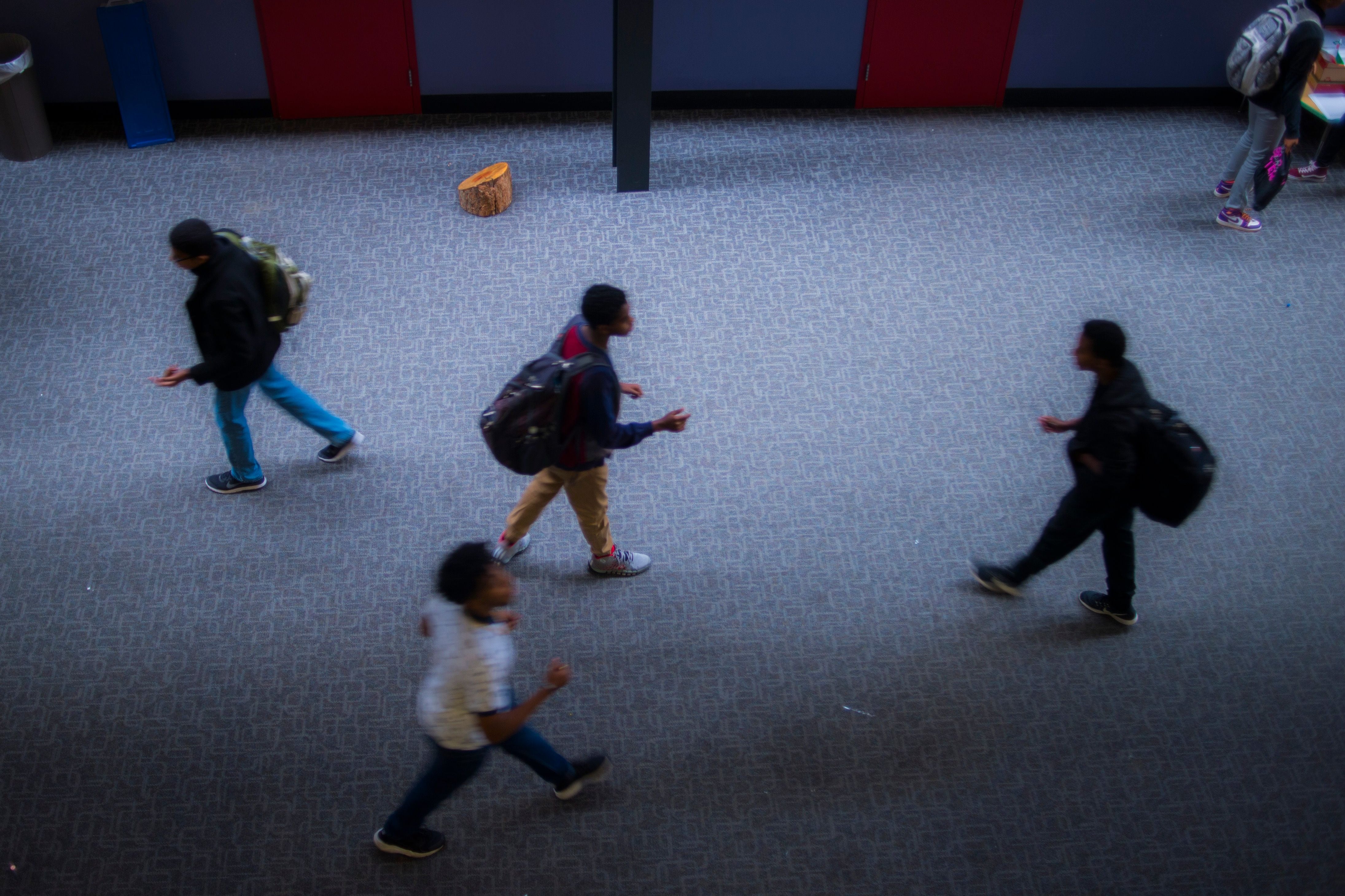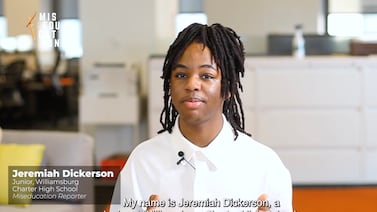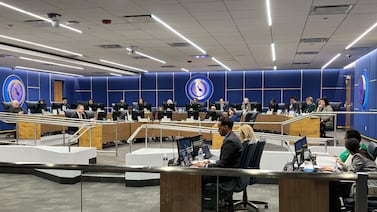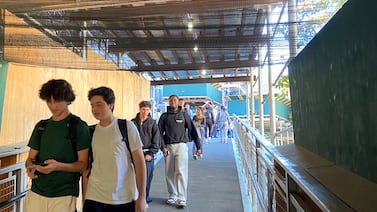The Denver school district once represented fertile ground for charter schools. But shifting politics and declining enrollment mean Colorado’s largest school district is becoming less friendly territory for the independent public schools.
“That trust and collaborative spirit that have historically existed have been called into question,” said Dan Schaller, president of the Colorado League of Charter Schools.
In recent years, the Denver school board has put time limits on opening new charter schools, asked tough questions about persistently low-performing ones, and gone toe-to-toe with the district’s largest charter network in a fight that ended up before the State Board of Education.
At the same time, charter schools face new pressures as enrollment goes down across the district, placing all schools in competition for students and the dollars that come with them. In the past three years, nine Denver charter schools have closed or announced that they will. While another six charter schools opened, one of those is closing after just two years.
Protected by state law, charter schools likely will be part of Denver’s school landscape for years to come. But tensions between the school board and charter supporters have come to a head repeatedly in recent months, most recently as the Denver school board voted on renewal requests from 13 of the district’s 58 charter schools.
Ultimately, the school board voted to approve all the renewal requests. But several board members made clear that they want things to change.
“I will be making several ‘no’ votes, not because I think the schools should be suddenly closed ... but because I do not agree with the contract terms,” board member Scott Baldermann said. “By approving long-term contracts, we remove the district’s ability to be nimble.”
‘That has just disappeared’
More than a fifth of all Denver students attend charter schools, the result of years of favorable policies, including sharing buildings and tax money, and encouraging the replication of high-performing charters as a strategy to boost districtwide test scores.
The most recent sign that the district’s attitude has shifted came earlier this month when district staff presented the board with their charter renewal recommendations. Each year, staff members spend months reviewing charters’ academic data, doing site visits, interviewing teachers, students, and parents, combing through school budgets, and sitting in on meetings of the governing boards of each school up for renewal.
The staff then make a recommendation to the Denver school board to either cancel a charter school’s contract or renew it for a certain number of years.
But in the case of two academically struggling schools this year — DSST Cole Middle School and GALS High School — district staff members instead presented the school board with a range of options but no recommendation. Charter advocates saw it as a subversion of the process.
“There’s always been a staff recommendation that we could then react to and probe and test,” board member Barbara O’Brien, who has been supportive of charters, said at a March 4 meeting. “But to see today’s PowerPoint where that has just disappeared ... it just makes me wonder what’s going on behind the scenes with board members pressuring staff presentations.”
Staff recommendations played a key role in a previous disagreement between the board and DSST. In October, the board voted to delay the opening of a new DSST high school. As allowed by law, DSST appealed the decision to the State Board of Education, which zeroed in on the fact that the Denver board had gone against a staff recommendation. DSST won the appeal.
Colorado law says school districts can only turn down charter schools for a limited number of reasons, and the State Board can overrule local school board decisions.
But the decision did not sit well with some Denver board members.
“I won’t be bullied by DSST,” board member Tay Anderson said. “We need to be able to put all of our weight as a district down on this network and say, ‘Look, you went around [us] the first time we tried to hold you accountable and now you’re not going to get away with this one.’”
Board Vice President Jennifer Bacon said she was among the board members who asked district staff to avoid making recommendations for DSST Cole and GALS this month. Bacon implied she was hoping to steer clear of a public disagreement among board members.
“I did not think it would be fair to the staff, this district, or each other to be pitted against each other,” she said. “So I asked for a version in which there was flexibility to be able to deliberate.”
Charter schools across the city were watching with worry. A week and a half later, leaders from nearly all the charters in Denver sent the board a letter expressing their concerns that Denver was changing what the charters saw as a transparent and fair renewal process.
“Although this board may differ from boards of the past and have differing opinions about charter schools ... it is a reasonable expectation that you act with integrity,” the letter said.
The letter noted that the school board claims to prize listening to the community, which includes the 22% of Denver students who attend charters.
“We, and the 20,000 students and families our schools serve, are the community, too,” it said.
Insurmountable challenges
In the past three years, nine Denver charter schools have closed or announced that they will. In that same time, six charter schools opened. However, one of the schools that opened is now closing. The CUBE, an innovative hands-on high school, will shutter after just two years. The main contributing factors? Low enrollment and trouble securing a permanent location.
“This is a situation where we’ve built something really, really cool,” founder Bret Poppleton said. “This isn’t a situation of, ‘We have to close because things are bad.’ We have to close because there are these things that are insurmountable.”
Those same insurmountable factors were cited by nearly all of the charter schools that closed in recent years. And because of district policy, the two challenges are intertwined.
Whereas Denver Public Schools once had plenty of empty buildings to share with charters, that’s no longer the case. To ensure that what little space is left is distributed fairly, the school board passed a policy in 2015 that grants space in district-owned buildings based partly on enrollment demand: The district will only allow a charter school to take up residence if more schools are needed to serve the students in that neighborhood.
That is rarely the case anymore for two reasons: stagnating enrollment and a shifting approach to school improvement. Instead of closing struggling district-run schools, this school board has preferred to try to help them improve, leaving no room for charters to take their place. Instead, most charters must find buildings on their own, a costly venture in a hot real estate market.
And the enrollment situation seems unlikely to improve anytime soon. Last year, the district had about 93,800 students in preschool through 12th grade, according to district data. Before the pandemic, district staff estimated enrollment would decline by nearly 1% this year. But due to factors related to COVID-19, the dropoff was steeper: more than 3%.
That’s quite a change for a district that was once considered the fastest-growing urban district in the country. In some ways, charters have had to face the reality of flat or declining enrollment sooner than district-run schools. Whereas the district subsidizes its small schools, charters don’t benefit from a mother organization that can support schools with financial struggles.
As a result, charter schools often have to make hard decisions that can feel abrupt and heartbreaking to families whose students are thriving there. School closures also cause real disruption for students who have to scramble to find a new school.
“It was unreal when they told us we had a week and a half to fill out our choice forms,” parent Tara Melinkovich said shortly after The Boys School of Denver announced it was closing last year due to low enrollment. All students, including her son, had to find new schools.
“I was bawling,” she said. “I not only had to hold space for my child who was devastated, but I also had to hustle and be like, ‘Where the hell am I going to send him next year?’”
‘Elevating the voices’
In the midst of these demographic and political changes, four homegrown Denver charter networks have banded together to form a new advocacy organization.
Denver Families for Public Schools launched at the beginning of this year with the backing of DSST, STRIVE Prep, Rocky Mountain Prep, and University Prep. Executive Director Ray Rivera said the goal is “elevating the voices of families who attend these charter schools in Denver and making sure they’re part of the public policy that gets made.”
The organization’s first few initiatives have been non-controversial: holding virtual school fairs during the COVID-19 pandemic and advocating for teachers to get access to the vaccine.
But there’s a chance the organization will become political. Denver Families for Public Schools is a type of nonprofit known under the federal tax code as a 501(c)4. That means it can raise and donate unlimited amounts of money in political elections without disclosing its donors. And Denver school board elections have become big-money affairs.
In 2019, total spending in an election for three open seats on the board topped $2.2 million, with 501(c)4 groups spending more than $1 million. That election saw a union-backed majority more skeptical of charter schools take control of the school board for the first time in a long time.
Four seats on the seven-member board are up for election this November. Rivera, who has long worked in progressive politics, including in the Obama administration, said he’s not sure yet if his group will endorse school board candidates, but it does plan on registering voters.
However, Rivera said he doesn’t want charters’ relationship to the district to be adversarial.
“This group is trying to say, ‘This doesn’t have to be adversarial,’” Rivera said. “It does feel like the collaboration is deteriorating right now, and what you have from the charter school families is a willingness to get back to collaboration.”
Board Vice President Bacon also signaled last week the need for charters and district leaders to work together to confront what she called a new landscape — one in which enrollment is down, buildings are scarce, and some charter networks historically known for high test scores are struggling with academic performance at some of their schools.
“I am asking that our landscape comes together and leans into this notion that this is not five years ago,” she said. “We have the opportunity to do things differently. We can support each other in ways we haven’t, but we’re also going to have to make some hard decisions.”
Correction: This story has been updated to reflect that four charter networks founded Denver Families for Public Schools, not five. The organization initially identified a fifth network, Highline Academy, as part of the group but has since clarified that is not true.






